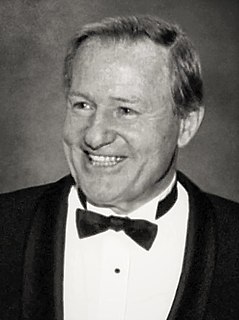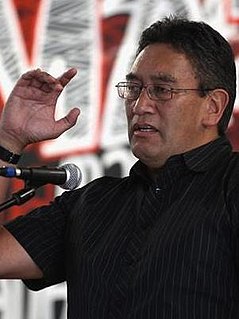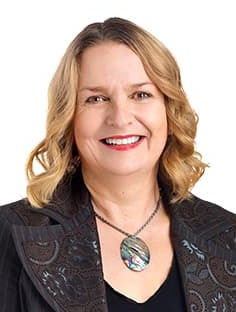Related Research Articles

Winston Raymond Peters is a New Zealand politician serving as the leader of New Zealand First since its foundation in 1993. Peters served as the 13th deputy prime minister of New Zealand from 1996 to 1998 and 2017 to 2020, the minister of Foreign Affairs from 2005 to 2008 and 2017 to 2020, and the treasurer of New Zealand from 1996 to 1998. He was a Member of Parliament (MP) from 1979 to 1981, 1984 to 2008 and 2011 to 2020.
New Zealand First, commonly abbreviated to NZ First, is a nationalist and populist political party in New Zealand. The party formed in July 1993 following the resignation on 19 March 1993 of its leader and founder, Winston Peters, from the then-governing National Party. Peters had been the sitting Member of Parliament for Tauranga since 1984 and would use the electorate as the base for New Zealand First until consecutive defeats by National Party candidates in 2005 and 2008. His party has formed coalition governments with both major political parties in New Zealand: first with the National Party from 1996 to 1998 and then with the Labour Party from 2005 to 2008 and from 2017 to 2020. Peters has served on two occasions as deputy prime minister.

The 2002 New Zealand general election was held on 27 July 2002 to determine the composition of the 47th New Zealand Parliament. It saw the reelection of Helen Clark's Labour Party government, as well as the worst-ever performance by the opposition National Party. The 2020 election would see it suffer a greater defeat in terms of net loss of seats.

The 1999 New Zealand general election was held on 27 November 1999 to determine the composition of the 46th New Zealand Parliament. The governing National Party, led by Prime Minister Jenny Shipley, was defeated, being replaced by a coalition of Helen Clark's Labour Party and the smaller Alliance. This marked an end to nine years of the Fourth National Government, and the beginning of the Fifth Labour Government which would govern for nine years in turn, until its loss to the National Party in the 2008 general election. It was the first New Zealand election where both major parties had female leaders.

The 1996 New Zealand general election was held on 12 October 1996 to determine the composition of the 45th New Zealand Parliament. It was notable for being the first election to be held under the new mixed-member proportional (MMP) electoral system, and produced a parliament considerably more diverse than previous elections. It saw the National Party, led by Jim Bolger, retain its position in government, but only after protracted negotiations with the smaller New Zealand First party to form a coalition. New Zealand First won a large number of seats—including every Māori electorate, traditionally held by Labour. Its position as "kingmaker", able to place either of the two major parties into government, was a significant election outcome.

The Tauranga by-election was a by-election in the New Zealand electorate of Tauranga, a city in New Zealand's North Island. It took place on 17 April 1993, and was precipitated by the resignation from parliament of sitting MP Winston Peters. Peters, who had been increasingly at odds with his National Party colleagues, had resigned both from his party and from Parliament. He contested the seat as an independent.

The 1993 New Zealand general election was held on 6 November 1993 to determine the composition of the 44th New Zealand Parliament. Voters elected 99 members to the House of Representatives, up from 97 members at the 1990 election. The election was the last general election to use the first-past-the-post electoral system, with all members elected from single-member electorates.

In New Zealand politics, Māori electorates, colloquially known as the Māori seats, are a special category of electorate that give reserved positions to representatives of Māori in the New Zealand Parliament. Every area in New Zealand is covered by both a general and a Māori electorate; as of 2020, there are seven Māori electorates. Since 1967, candidates in Māori electorates have not needed to be Māori themselves, but to register as a voter in the Māori electorates people need to declare that they are of Māori descent.
Katherine Victoria O'Regan was a New Zealand politician. She was a member of parliament from 1984 to 1999, representing the National Party. She served as a minister for the National Government for six of those years.
Tuariki John Edward Delamere is a former New Zealand politician. He served as a member of the New Zealand Parliament from 1996 to 1999, and was a member of Cabinet for the duration of his term.

The 2008 New Zealand general election was held on 8 November 2008 to determine the composition of the 49th New Zealand Parliament. The liberal-conservative National Party, headed by its parliamentary leader John Key, won the largest share of votes and seats, ending nine years of government by the social-democratic Labour Party, led by Helen Clark. Key announced a week later that he would lead a National minority government with confidence-and-supply support from the ACT, United Future and Māori parties. The Governor-General swore Key in as New Zealand's 38th Prime Minister on 19 November 2008. This marked the beginning of the Fifth National Government which governed for the next nine years, until the 2017 general election, when a government was formed between the Labour and New Zealand First parties, with support on confidence and supply by the Green Party.

Tauranga is a New Zealand parliamentary electorate, returning one Member of Parliament to the New Zealand House of Representatives. The current MP for Tauranga is Sam Uffindell of the National Party, who won the seat in the 2022 Tauranga by-election, following the resignation of the previous MP, Simon Bridges of the National Party.

Trevor Albert de Cleene was a New Zealand politician and lawyer. After gaining experience as a councillor with Palmerston North City Council, he was elected to Parliament for the Labour Party in 1981. He was a strong supporter of Rogernomics and was a minister outside cabinet. He resigned his ministerial portfolios in 1988 when Roger Douglas was sacked by David Lange. For his remaining parliamentary career, he was a backbencher known as one of the Three Musketeers. Later, he was a founding member of ACT New Zealand and some years later joined the National Party to help oppose Winston Peters in Tauranga.

Simon Joseph Bridges is a former New Zealand politician and lawyer. He served as Leader of the National Party and Leader of the Opposition between 2018 and 2020, and as the Member of Parliament for Tauranga from the 2008 election to May 2022, when he resigned.

The 2011 New Zealand general election took place on Saturday 26 November 2011 to determine the membership of the 50th New Zealand Parliament.

The 2011 Te Tai Tokerau by-election was a by-election in the New Zealand electorate of Te Tai Tokerau that was caused by Hone Harawira's resignation from the seat. He chose to re-contest it with the Mana Party in order to seek a new mandate for his views. After generating several days of media interest and criticism Harawira announced on 4 May 2011 that he was delaying his resignation in order to consult his supporters in his electorate. On 11 May 2011 Harawira wrote to the Speaker of the House to resign from Parliament, with effect from 20 May 2011. On 12 May 2011 the prime minister, John Key, announced that the by-election would be held on 25 June.
Richard Ivor Prosser was a New Zealand politician, writer, and winemaker. He was a member of New Zealand First party and was a Member of parliament from 2011 to 2017. While in Parliament, he voted against the Marriage Amendment Bill, which allowed same sex marriage. He attracted international attention in 2013 when he called for all young men who were Muslim or who "look like a Muslim" to be banned from Western airlines.

The 2017 New Zealand general election took place on Saturday 23 September 2017 to determine the membership of the 52nd New Zealand Parliament. The previous parliament was elected on 20 September 2014 and was officially dissolved on 22 August 2017. Voters elected 120 members to the House of Representatives under New Zealand's mixed-member proportional (MMP) voting system, a proportional representation system in which 71 members were elected from single-member electorates and 49 members were elected from closed party lists. Around 3.57 million people were registered to vote in the election, with 2.63 million (79.8%) turning out. Advance voting proved popular, with 1.24 million votes cast before election day, more than the previous two elections combined.
Clayton Robert Henry Mitchell is a former New Zealand politician. He was elected to the New Zealand parliament at the 2014 general election as a representative of New Zealand First and served two terms, leaving Parliament in 2020.

The 2022 Tauranga by-election was a New Zealand by-election held on 18 June 2022 in Tauranga when the seat became vacant due to the resignation of former National Party leader Simon Bridges. In a landslide result, the by-election was won by National's Sam Uffindell.
References
- ↑ "New Year honours list 2003". Department of the Prime Minister and Cabinet. 31 December 2002. Retrieved 26 July 2019.
- ↑ "Official Count Results -- Tauranga". Chief Electoral Office. Retrieved 28 February 2012.
- ↑ "Clarkson ticked off for 'crotch' comment". The New Zealand Herald. 14 September 2005.
- ↑ "Clarkson keeps seat, defeats Peters' challenge". The New Zealand Herald. 15 December 2005.
- ↑ "Clarkson stands up for 'Kiwi jokers'". The New Zealand Herald. 31 August 2006.
- ↑ Crewdson, Patrick (27 August 2006). "National MP Clarkson targets Muslims and gays". The New Zealand Herald.
- ↑ "'Bob the Builder' told off for offensive comment".
- ↑ "Tauranga seat back up for grabs". Television New Zealand. 9 May 2008.
- ↑ Bob Clarkson jumps ship to join Act Bay of Plenty Times, 1 June 2011